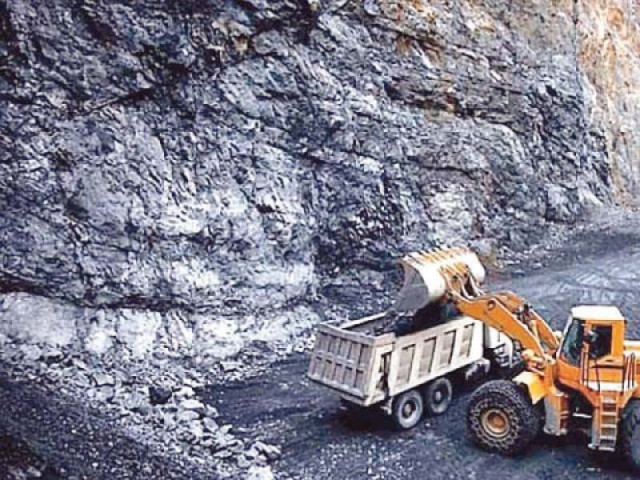Pakistan to start producing power from Thar coal in few days
One plant will begin test production between March 20 and 25, second in late April

The mine-mouth power plant would produce electricity at a 30-year levellised tariff of 11 US cents per unit (or Rs13 per kilowatt) … the share of power from coal-fired projects is set to increase to 11% in the near future. PHOTO: FILE
“We are scheduled to test one of the two 330-megawatt power plants based on Thar coal any day between March 20 and 25,” revealed Engro Powergen Thar CEO Ahsan Zafar Syed while talking to The Express Tribune.
The company will test the second plant in late April.
“We are four months ahead of the timeline set for switching on the power plants,” he said. “The project is almost done well within the budgeted cost (investment) of $1.1 billion while we have significantly saved cost of the mining project, which was originally estimated at $845 million.”
Both the plants will be connected to the national grid one by one through the 232km Thar-Mitiari transmission line during their testing phase.
In June, both the plants would formally start commercial production “as the commercial operation date (COD) of the first mine-mouth power project is set for June 2019,” he said.
Pakistan discovered the Thar coalfields in 1991. These contain the world’s seventh largest coal reserves of 175 billion tons, more than the combined oil reserves of energy-rich Saudi Arabia and Iran, and 68 times higher than Pakistan’s total gas reserves. Singh Engro Coal Mining Company (SECMC) - a group of seven stakeholders including the government of Sindh with 51% majority stake as well as Engro, the Habib Group and Hubco - has dug 148 metres down block-II in Thar coalfields in the past nine years.
SECMC has been allotted block-II which carries only 1% of the total reserves in Thar. “Coal deposits in block-II are enough to produce 5,000MW of electricity for the next 50 years,” Syed said. “We have invested a lot of time, money and human resources to make the dream come true.”
The two plants need 12,500 tons of coal each day (or 3.8 million tons per annum) to produce 660MW of electricity. This is one of the early harvest projects marked under the China-Pakistan Economic Corridor (CPEC) - a multibillion-dollar initiative of Beijing aimed at developing Pakistan’s infrastructure and power sectors.
“The two projects (power plants and coal mining) carry around $800 million in foreign loans, mostly from China,” he said, adding that the projects had a ratio of 25% equity and 75% debt.
The mine-mouth power plant would produce electricity at a 30-year levellised tariff of 11 US cents per unit (or Rs13 per kilowatt), he said, adding that the share of power from coal-fired projects was set to increase to 11% in the near future from around 7% at present. “It stood at around 1% two years ago.” However, Pakistan would be far away from the average 40% of electricity from coal-fired projects, Syed pointed out. He called Thar coal the answer to the existing power crisis in the country. “There is still a shortfall of 4,000MW between power demand and supply,” he said.
He pointed out that the locally produced coal, which is better known as lignite, was best for power production and similar coal was being utilised by European nations such as Germany and Poland. He shared that Thar coal would, in the long run, reduce burden on the country’s foreign currency reserves as Pakistan imported a huge quantity of oil and gas for power production.
In the second phase of Thar coal block-II project, two other companies - Thar Energy Limited (TEL) and ThalNova - will each set up 330MW power plants by 2021. Block-II will increase coal production by 3.8 million tons in each phase. It has a total of five phases and the first one is nearing completion.
“We dream of producing a total of 5,000MW through the supply of 30 million tons of coal by the time fifth phase is completed. However, timelines for the fifth and the last phase are yet to be determined,” he said.
Published in The Express Tribune, March 19th, 2019.
Like Business on Facebook, follow @TribuneBiz on Twitter to stay informed and join in the conversation.



















COMMENTS
Comments are moderated and generally will be posted if they are on-topic and not abusive.
For more information, please see our Comments FAQ